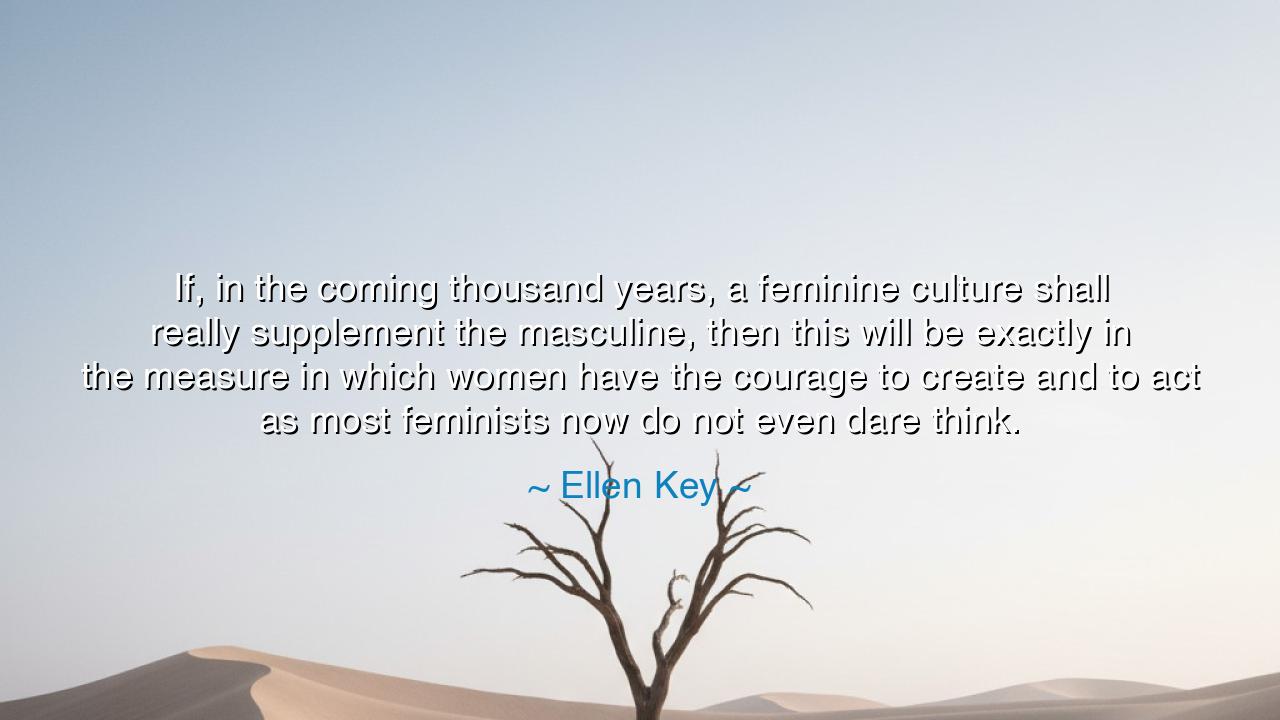
If, in the coming thousand years, a feminine culture shall really
If, in the coming thousand years, a feminine culture shall really supplement the masculine, then this will be exactly in the measure in which women have the courage to create and to act as most feminists now do not even dare think.






“If, in the coming thousand years, a feminine culture shall really supplement the masculine, then this will be exactly in the measure in which women have the courage to create and to act as most feminists now do not even dare think.” Thus spoke Ellen Key, the Swedish writer, reformer, and philosopher whose voice rose at the dawn of the twentieth century to call for a deeper and more spiritual liberation of women. Her words are not the cry of rebellion, but the song of awakening—a vision of balance between the powers of man and woman, reason and intuition, conquest and creation. She foresaw that the redemption of civilization would come not from domination, but from courage—the courage of women to create, to act, and to imagine beyond the boundaries of what society allows them to dream.
The origin of this quote is found in Ellen Key’s work on education, love, and gender, where she sought to define not equality as sameness, but as harmony between the masculine and feminine forces of the world. In her time, women were fighting for political and legal rights—a battle that was necessary but incomplete. Key saw that true freedom could not be granted by law alone; it had to be born from within the soul. To her, feminine culture was not merely the rise of women into the domains of men, but the flowering of new values: compassion, creativity, and spiritual insight. Yet she lamented that many lacked the courage to go beyond imitation—to build something new, something deeply their own.
She understood that throughout history, the masculine principle had ruled: the age of conquest, of power, of reason, and of external achievement. It was this energy that built empires and forged machines, but also brought war and division. The feminine principle—gentleness, intuition, nurturing, and inner creation—had long been suppressed or dismissed as weakness. Ellen Key dared to prophesy a future in which these forces would stand side by side, each tempering and completing the other. But she warned: this new age would not come through imitation or resentment. It would come only when women dared to think, to create, and to act with the full force of their own spiritual and intellectual might.
Consider the life of Marie Curie, who, around the very same era, embodied the courage of which Ellen Key spoke. In a world that denied women access to laboratories and universities, Curie broke through the walls of prejudice—not to imitate men, but to fulfill her own vision of discovery. Her work with radioactivity was not an act of defiance alone, but of creation—a bringing forth of light from the darkness of ignorance. She did not fight for recognition; she became it. And in doing so, she helped reshape the image of what a woman could be. Her courage was quiet, her focus absolute, her legacy eternal. Such is the feminine culture Key envisioned—not a mirror of the masculine world, but a new horizon entirely.
To create is to risk misunderstanding; to act is to invite resistance. Ellen Key knew this, for she herself was scorned by both traditionalists and radicals. The former accused her of rebellion, the latter of idealism. Yet she stood firm, believing that the truest revolution is born not from hatred, but from vision. “The courage to create,” she implies, is the courage to think differently, to see beyond convention, to plant seeds whose flowers will not bloom for centuries. This is the heroism of the soul—the quiet strength to live by one’s truth when the world is not yet ready to receive it.
The lesson, then, is not for women alone, but for all humanity: progress comes only when the creative spirit dares to surpass imitation. The future that Ellen Key foretells—a world where the feminine complements, not competes with, the masculine—depends upon the courage to imagine beyond the limits of one’s age. Whether man or woman, to shape a better civilization is to awaken both principles within oneself: the power to act and the compassion to heal, the intellect to reason and the heart to feel. The soul that balances these becomes the architect of harmony.
So, my listener, take these words as a call to your own courage. Do not wait for permission to create. Do not confine your spirit within the walls of the familiar. The world needs not more imitators, but visionaries—those who dare to think as others fear to, and who act from the truth of their being. If the coming thousand years are to be an age of balance, compassion, and wisdom, it will be because enough souls, especially women, found the bravery to dream beyond what was thought possible.
Therefore, let this be your creed: to create is sacred, to act is divine, and to do both with love is to shape eternity. In every age, the world waits for those who have the courage to think beyond fear and to live by that thought. Let that courage be yours, and you will be part of the great unfolding of what Ellen Key called the feminine culture—not a victory of one over another, but the dawning of a world made whole.






AAdministratorAdministrator
Welcome, honored guests. Please leave a comment, we will respond soon